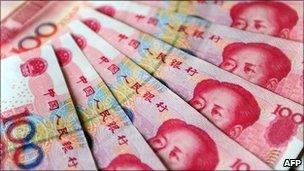London seeks lead role as China's currency goes global
- Published

China is promoting the usage of the yuan as a rival international currency to the dollar
Almost two years ago, a little-known Sheffield-based maker of garden spades and lawn rakes made financial history.
Neill Tools was the first UK company to make a cross-border payment in the Chinese currency, with the help of banking giant HSBC.
"The volume of yuan-denominated trade in the UK will inevitably increase," the HSBC banker in charge of the deal said at the time.
The transaction was an unlikely harbinger of a shift in the global financial system, and the prediction about the importance of the Chinese currency in trade proved prescient.
Today, UK banks hold 35 billion yuan ($5.5bn;£3.5bn) worth of deposits in the Chinese currency, also known as the renminbi.
Most comes from companies, like Neill Tools, that now pay their Chinese suppliers and business partners in the yuan rather than in dollars and pounds - something that was impossible less than three years ago.
"I receive phone calls on a daily basis from companies wanting to know about the process of using the renminbi," says Janet Ming, head of the Royal Bank of Scotland's London China desk.
<bold>Growing trade</bold>
How the City's banks and financial institutions capture this growing trade will be key to securing London's future as a global financial centre.

London's bid to become a Western hub for the trade in the Chinese currency is gaining traction
However, London's financial activity in the yuan is still relatively limited, especially when compared to Hong Kong, which has been the main winner in China's push to extend its currency's global reach.
This week UK banking executives, along with officials from the Treasury and the City of London, meet in Hong Kong to discuss what they can learn from their former colony.
According to an April report by the City Of London Corporation, London's banks already hold more than 109 billion yuan worth of deposits, with 35 billion yuan estimated to be held in customer accounts.
The remainder are made up of institutional and interbank deposits - held by one bank on behalf of another.
While this is much less than the 554 billion yuan held in Hong Kong bank accounts, the emergence of another pool of yuan outside Hong Kong is important, says Kelvin Lau, an economist at Standard Chartered.
"It not only illustrates London's inherent strength as an international financial centre and its geographical and time-zone advantages in serving Western customers; more importantly it reflects growing (yuan) demand on an international scale," he says.
London also accounts for a quarter of foreign exchange trading in the yuan and last month, HSBC became the first company to issue debt denominated in the Chinese currency in London.
"London's strength is its institutional investor base; it is anticipated that as corporate and institutional deposits grow, so too will the liquidity of the London market," the report said.
Clear rationale
London's rationale in seeking to develop its role as an offshore centre for trading in the yuan is easy to understand. It is keen to boost trade with China, and the City is angling for new avenues of business.
And unlike their counterparts in New York, UK government officials have been particularly active in promoting London's financial strengths to China.
"As the world's leading financial centre, London is uniquely well placed to assist China in its goal of further expanding the international use of the renminbi," UK Chancellor George Osborne said last month at the launch of a City initiative designed to strengthen London's position as a hub for renminbi business.

UK bankers and officials from the Treasury and the City of London meet in Hong Kong this week
Beijing, meanwhile, wants the yuan to play a bigger role in the global financial system and reduce its reliance on the dollar. A push to make it internationalise its currency, which began in earnest in 2009, has taken on more urgency in recent months.
As such, "it makes sense to promote a new offshore centre, located in a different time zone to Hong Kong, which would appeal to businesses in Europe," says Dariusz Kowalczyk, senior economist at Credit Agricole.
Until the last decade, the renminbi was rarely seen beyond China's borders and Beijing still controls the flow of money in and out of the country.
Constraints
London's bid to take its slice of international trade and investment in the yuan is constrained by two main factors.
Firstly, London lacks a natural customer base for many yuan financial products and services.
Retail investors or individual savers in the UK have less incentive to hold the yuan compared to their counterparts in Hong Kong, where the yuan is an accepted method of payment and mainland China a short bus or train ride away.
Appetite for yuan products is likely to be stronger among the London's army of institutional investors. However, waning expectations for appreciation in China's currency as its economy slows could diminish the market's appeal.
And many European companies are still nervous about making and receiving payments in the yuan despite suppliers offering discounts of up to 10% for those willing to take the risk.
"Some companies are concerned because they are not sure how to hedge the transaction or how to get the currency converted," says Ms Ming.
"But Chinese suppliers are increasingly favouring payment in renminbi."
The second obstacle is London's lack of direct access to market infrastructure like settlement and clearing - only Hong Kong and Macau have clearing banks outside of mainland China.
This reinforces Hong Kong's position as the most obvious place to settle transactions and make deals in the yuan.
London is hoping to bridge this gap through an extension of the operating hours of Hong Kong's real time renminbi settlement system, which is expected to take effect at the end of June.
"The London market is still in its early stages and I think it will take some time, especially for individuals, to be comfortable holding the yuan," says Ms Ming.
"But it's not a matter of whether they should consider it, it's a matter of when."
- Published8 May 2012
- Published18 April 2012